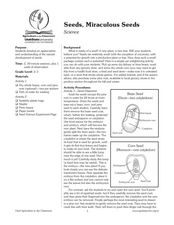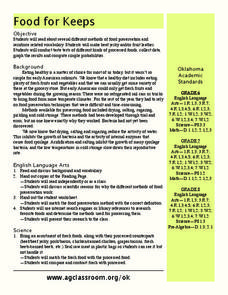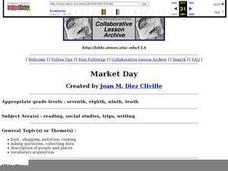Curated OER
Ag Pays
Second graders understand that may jobs relate to agriculture. In this agriculture lesson, 2nd graders role play several agricultural jobs and the goods associated with them. Students may contact a community member with that job.
Curated OER
Beanie Baby
Students will explain the importance of soybeans. In this science instructional activity, students participate in making a "beanie baby" necklace. Additionally, students observe their soybeans for germination and growth for 7-10 days....
Curated OER
Microorganisms: Good Guys or Bad Guys?
Learners discover the role microorganisms play in our lives. In this decomposition activity, students examine decaying foods and plants in order to analyze the different bacteria that grows. Learners discuss the good and bad of...
Curated OER
Microbes and Health
Students participate in activities that show them how tiny germs are spread. In this germs lesson plan, students engage in hands on lessons to show them how microorganisms can easily spread disease through the mouth and hands.
Curated OER
Seeds, Miraculous Seed
Students investigate relationships between plants and animals and how living things change during their lives. In this life cycle lesson, students split different types of seeds apart to see the beginning life stages of future plants.
Curated OER
Agriculture- It's More Than You Think
Learners research careers in agriculture. In this agricultural lesson, students discover the various careers related to agriculture. Learners construct resumes and "apply" for agricultural jobs.
Curated OER
Food Labels
Students study nutrition and the facts about food labels. In this investigative lesson students examine food labels and the health facts and serving sizes.
Curated OER
Next Year's Seeds
Reading, a math game, and a simulation activity provide the engagement on a lesson about seeds and crops. Learners in grades two through four read an informational passage about crops, seeds, and farming. They highlight important...
Curated OER
Activity Plan Mixed Ages: Friendship Soup
Students learn creative cooking. In this early childhood lesson plan, students children work together to plan, buy, and prepare a soup for their lunchtime meal.
Curated OER
Terrariums: A Look at the Living and Nonliving World
Third graders examine life in a terrarium and relate it to life in a larger environment. In this terrarium lesson, 3rd graders examine how living and non-living things work together by examining the changes in a terrarium. They make...
Curated OER
Career & Technology Education Introduction to Farming: Seeds of Successful Marketing
Students play an agronomy game. In this agriculture lesson plan, students explore modern farming practices pertaining to the cultivation of grains as they play a game that requires them to act as agronomy specialist as they...
Curated OER
Food For Keeps
Middle schoolers explore food. In this processed and fresh foods instructional activity, students discover how some foods are processed and how they differ from fresh food. The complete group activities and an individual reading...
Curated OER
Where Do Your Veggies Grow?
Students examine the different ways fruits and vegetables are grown. In this vegetable growth instructional activity students are presented with the three ways that the vegetation occurs: leaves, roots, or branches. The students group...
Curated OER
Better Butter
Students explore the process of making butter. In this agriculture lesson, students discuss how butter is made today and how it was made in the past. Students make their own butter using baby food jars and some "elbow grease."
Curated OER
Food Preservation: Food Science, Canning, Gardening
Learners consider the procedures and safety issues involved in food preservation. They conduct experiments in canning, freezing and drying. If everyone can preserve food utilizing a variety of methods and science principles, the lesson...
Griffen Publishing
Learning From the Past
The big idea for this lesson is that the past enriches our present and future. Learners explore the origin of the Olympic Games and how one man took an event from the past and reinvented it for modern times. They compare and contrast the...
Curated OER
Organic Mechanic Part I
On day one of the "Organic Mechanic Part I" lesson, learners try to remove the waxy coating of an apple and consider pesticides that may be represented by this addition to our food. On day two, they research pesticides online and...
Edgate
Learning From the Past: Origin of the Modern Summer Games
Where did our beloved Summer Games originate? Kids look for the origins of the Summer Olympics in our ancient past. They research how the Games came to be and how they have changed. They'll complete Venn diagrams to compare and contrast...
Curated OER
All About Seeds!
First graders learn all about seeds. In this biology lesson, 1st graders discover: what a fruit is, what is inside of seeds, and how seeds are transported.
Curated OER
Where is Away?
Focusing on where are garbage goes once we dispose of it, learners explore environmental concerns. Using a clear format, this lesson leads learners through a discussion of waste reduction, recycling, and composting. Then, they discuss...
Curated OER
Delayed Gratification
Word problems are great for engaging critical thinking skills, and word problems involving money increase a child's financial literacy. Boost your critical and financial thinkers with a multi-step word problem involving money and problem...
Curated OER
Earth Bags
Students discuss the environment and the problems facing our natural resources. They write ways to help the environment on paper grocery bags, illustrate them, and distribute them to grocery stores to be used with customers.
Curated OER
Market Day
Students visit their local grocery store and break into groups. Each group performs a different task while taking notes, and then returns back to the classroom to write about what they've witnessed.
Curated OER
Activity Plan 4-5: Riddles by the Bagful!
Students write a riddle to be included in a class riddle book. In this creative-thinking lesson plan, the teacher will introduce children to riddles, then guide children through the process of writing and illustrating their own riddles...























